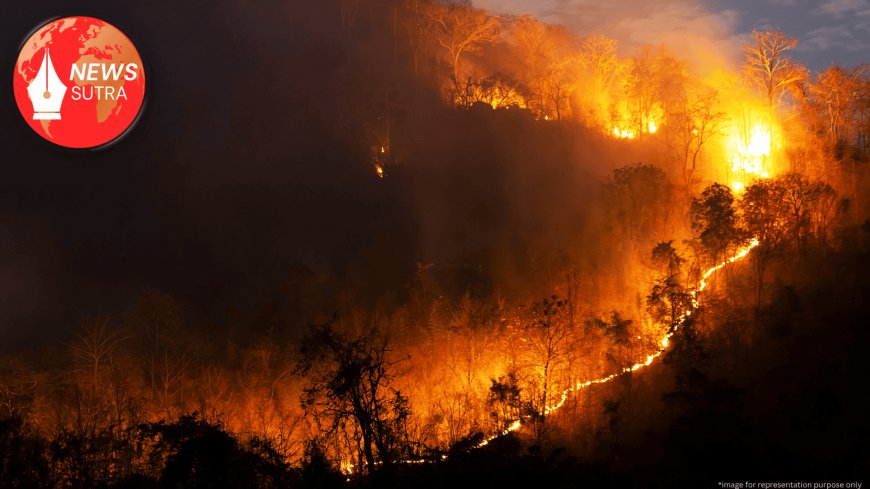Scorching Summer Inferno: Wildfires Ravage Turkey and Cyprus Amid Record Heatwave
Massive wildfires have erupted across Turkey and Cyprus as extreme summer heat grips the region. Firefighters battle relentless blazes fueled by record temperatures and dry winds, causing evacuations and widespread damage.

An intense Mediterranean heatwave has unleashed widespread wildfires across western Turkey and Cyprus since mid-week, claiming lives, uprooting communities, and prompting emergency evacuations as firefighters struggle to contain flames fueled by extreme temperatures and gale-force winds. This unfolding crisis is being compared to some of the region’s worst fire seasons in recent memory.
1. Central Turkey’s Deadly Blaze
In central Turkey’s Eskişehir province, a wildfire erupted on Tuesday and rapidly engulfed steep, forested terrain. The blaze proved lethal: ten firefighters lost their lives and 14 others were injured, according to Agriculture and Forestry Minister İbrahim Yumaklı Reuters+13Reuters+13Reuters+13. The fire later spread into neighboring Afyonkarahisar.
Minister Yumaklı acknowledged the extraordinary conditions: “Strong winds and scorching heat have created extremely dangerous conditions” The Guardian+5Reuters+5Reuters+5. Thick forests, poor accessibility, and shifting winds trapped firefighting units near Eskişehir’s Seyitgazi district.
Other provinces—Bilecik, Sakarya, Karabük, and Manisa—also remain on alert with multiple fires ongoing. In Bilecik, villagers narrowly escaped as fires encircled their settlements, leading to evacuations and road closures ReutersReuters+5Reuters+5Reuters+5.
2. Cyprus: Inferno in the Vineyards
Meanwhile in southern Cyprus, a major wildfire near Limassol devastated approximately 100 km² of mainly vineyard-covered terrain Reuters+15Reuters+15Reuters+15. Two people were tragically found dead in a vehicle, apparently trapped as they fled the inferno Al Jazeera+5Reuters+5Reuters+5.
At least ten others sustained injuries, with two in critical condition, authorities confirmed The Guardian+3Reuters+3Al Jazeera+3. Homes and outbuildings were destroyed, and multiple villages faced mandatory evacuation as firefighters raced to contain the blaze Wikipedia+15Reuters+15The Guardian+15.
City officials attributed the ferocity of the Cyprus fires to soaring temperatures reaching 44 °C (111 °F) and powerful winds The Times+15Reuters+15The Guardian+15.
3. Extreme Heatwave Conditions
The fires coincide with an unprecedented Mediterranean heatwave. In Cyprus, temperatures soared to record highs—43 °C on Wednesday and almost 44 °C on Thursday ReutersAL-Monitor. Turkey’s central provinces also experienced temperatures 6–12 °C above seasonal norms Wikipedia+3The Guardian+3Reuters+3.
Warm, dry conditions and powerful gusts—40–50 km/h in Turkey—have supercharged fire behavior and hindered containment efforts WikipediaReuters.
4. Response and Evacuations
Firefighting efforts have mobilized a full spectrum of resources:
-
In Turkey: Over 1,000 firefighters, 100 fire trucks, 14 helicopters, four air tankers, and heavy machinery are deployed across six provinces Wikipedia+1Wikipedia+1.
-
In Cyprus: Fire crews backed by 14 aircraft from Spain, Egypt, Jordan, Israel, and even UK bases in the region are now assisting The Guardian+9Reuters+9Reuters+9.
Villages across Eskişehir, Bilecik, Sakarya, Karabük, Manisa, and Limassol were evacuated. Some residents have returned to areas deemed safe AP News+8Reuters+8Reuters+8.
5. Human Cost and Personal Stories
Community voices paint a vivid and tragic picture:
-
A firefighter trapped during a sudden wind shift described how crews were caught off-guard uphill and suffered the whirlwind’s destructive force ReutersAP News.
-
Father Michalis, a Greek Orthodox priest from Cyprus’s Lofou village, described waking to a “towering wall of flames” while evacuating parishioners amid raging flames Reuters+2Reuters+2AL-Monitor+2.
-
A villager from Selcik, Turkey, lamented, “They couldn’t intervene... it engulfed our village from two or three sides” Reuters+3Reuters+3AL-Monitor+3.
6. International Assistance
Several nations have rallied to assist Cyprus through the EU Civil Protection Mechanism. Spain, Jordan, Egypt, Israel, and the UK have contributed aerial assets and support teams Reuters+1Reuters+1. Northern Cyprus has also offered aid ReutersAL-Monitor.
7. Wider Mediterranean Fire Trends
The current eruptions echo a grim pattern across southern Europe this year:
-
Late June brought wildfires to İzmir, Turkey, forcing over 50,000 evacuations ReutersWikipedia+3Wikipedia+3Wikipedia+3.
-
Earlier in July, Greece and south France experienced large-scale fires under similar heatwave conditions ReutersAP News.
-
Europe has seen over 227,000 hectares burned in 2025—well above recent averages Reuters.
Scientists link the surge in fire intensity and frequency directly to climate change—rising sea temperatures and erratic weather form a dangerous feedback loop ReutersAL-Monitor.
8. Structural and Environmental Vulnerabilities
Turkey’s wildfires were exacerbated by inaccessible terrain, fragmented infrastructure, and thinning forest-health—all products of drought and environmental degradation ReutersWikipedia.
Meanwhile, Cyprus’s steep and vine-dense landscape, under extreme heat, created a perfect storm—rapid fire development and limited firebreaks Wikipedia+15AL-Monitor+15Reuters+15.
9. Safeguards and Future Measures
Officials in both countries called for urgent reforms:
-
Invest in forest management, clear out flammable undergrowth, and build firebreaks.
-
Enhance early-warning systems and public evacuation procedures.
-
Reinforce firefighting infrastructure, focusing on aerial units, night-capable helicopters, and better-equipped ground crews.
-
Accelerate climate mitigation including green energy transitions and reforestation to reduce fire risk.
10. What Comes Next?
The immediate forecast remains bleak—red and amber alerts are in place through the weekend for both regions, with further lightning and gusty wind patterns expected Reuters+1Reuters+1.
Authorities encourage residents and tourists to follow alerts, avoid fire-prone areas, and prepare evacuation plans. Travel advisories from the UK and US continue to caution against the affected zones The TimesCondé Nast Traveler.
Conclusion
The wildfires raging across Turkey and Cyprus are a stark reminder of the fragility of life and ecosystem under extreme heat—a phenomenon no longer occasional, but increasingly routine. As firefighters battle flames in blistering conditions, international cooperation has become a touchstone of survival in the Mediterranean.
From loss of life and homes to long-term habitat destruction, this crisis underscores the urgent need for climate adaptation, public preparedness, and environmental stewardship. What unfolded over the past few days may well define the future of regional disaster response—and be a clarion call for action where high temperatures meet low resilience.




















































